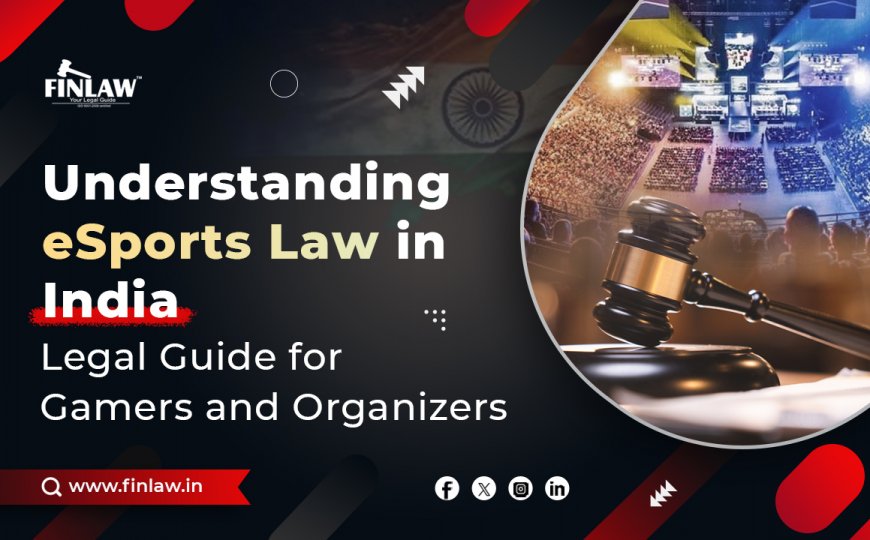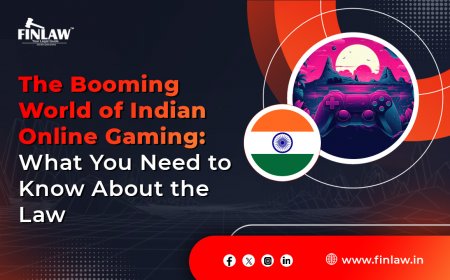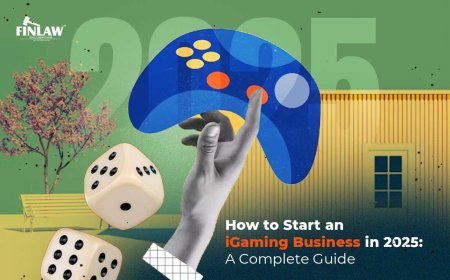Understanding eSports Law in India: Legal Guide for Gamers and Organizers
Explore eSports law in India, covering laws, regulations, taxation, and player protections for gamers and organizers in this comprehensive guide.

India's eSports ecosystem has seen a meteoric rise over the last decade, with millions of gamers engaging in competitive play, while tournaments and streaming platforms continue to proliferate. The country has become a global hub for eSports enthusiasts, attracting players, organizers, and investors from across the world. From games like PUBG Mobile and Free Fire to Dota 2 and Valorant, the scale of participation and viewership is staggering. However, despite this rapid growth, the legal landscape surrounding eSports in India remains complex and fragmented.
In this comprehensive guide, we will break down the key aspects of eSports law in India, focusing on the relevant legal considerations for gamers, tournament organizers, and investors. We will explore the classification of eSports, applicable eSports laws in India, the role of self-regulatory bodies, taxation, intellectual property issues, and much more. By the end, you will gain a clear understanding of the legal challenges and opportunities within this exciting, fast-growing sector.
Legal Classification: Game of Skill vs. Game of Chance
A crucial legal question in eSports regulation in India revolves around whether eSports games are considered "games of skill" or "games of chance." This distinction significantly impacts the legality of online gaming platforms and tournaments.
-
Games of Skill: These are activities where players' expertise, strategy, and judgment are the primary factors in determining the outcome. In India, games that predominantly require skill are not subject to gambling laws, making them legal in most parts of the country. For example, games like Counter-Strike and Dota 2, where success relies on the player's skill and strategy, fall under this category.
-
Games of Chance: These games are heavily influenced by luck, such as roulette, slot machines, and lotteries. These are strictly regulated under the Public Gambling Act, 1867, and are considered illegal in most Indian states.
The Indian judiciary has repeatedly upheld the classification of certain online games as "games of skill." Games like fantasy sports (e.g., Dream11), rummy, and poker have been recognized as skill-based games and are legal in states where online gaming is allowed. As a result, eSports games that rely on player expertise are generally considered legal, provided they are not used for gambling or betting purposes.
Key Legislation Impacting eSports in India
Several important eSports laws and regulations play a role in shaping the legal environment for eSports in India:
-
The Public Gambling Act, 1867: This eSports law is primarily concerned with gambling and betting, and it makes games of chance illegal in most states. However, as mentioned earlier, eSports games that are categorized as games of skill are exempt from this Act.
-
The Prize Competitions Act, 1955: This Act governs competitions where participants compete based on skill, judgment, or knowledge for prizes. It provides a legal framework for organizing skill-based competitions, which is essential for eSports tournaments offering cash prizes or other rewards.
-
The Information Technology (Intermediary Guidelines and Digital Media Ethics Code) Rules, 2021: These rules provide a regulatory framework for online gaming platforms, including eSports. They require platforms to register with self-regulatory bodies (SRBs) to ensure compliance with fair play practices, user safety, and data protection standards. This is especially important for online tournaments and gaming platforms.
-
The Companies Act, 2013: As eSports organizations are often structured as corporate entities, this Act governs their registration, operations, and corporate compliance. It provides a legal foundation for forming businesses within the eSports sector.
-
The Consumer Protection (E-Commerce) Rules, 2020: These rules regulate e-commerce platforms, including those hosting online gaming. They ensure transparency, fairness, and accountability, which are essential for eSports platforms dealing with user transactions, prize distribution, and advertising.
State-Specific Regulations on Online Gaming
India's legal framework for online gaming is further complicated by state-specific regulations. While some states have enacted specific laws for online gaming, others continue to enforce a blanket ban on gaming activities.
-
Nagaland: This state is a pioneer in regulating online gaming. The Nagaland Prohibition of Gambling and Promotion of Online Games of Skill Act, 2016, provides a clear legal pathway for online gaming platforms, including eSports tournaments. It allows games that are primarily skill-based to operate legally within the state.
-
Sikkim: Known for its progressive approach to online gaming, Sikkim introduced the Sikkim Online Gaming (Regulation) Rules, 2009, which permit the operation of online gaming platforms. This makes Sikkim one of the few states in India with a comprehensive legal framework for online gaming.
-
Maharashtra: Maharashtra has taken steps toward regulating online gaming, particularly by addressing concerns related to cybercrime and online fraud. The state is working on drafting legislation to ensure that online gaming platforms comply with security and fairness standards.
-
Tamil Nadu: Tamil Nadu has been more restrictive, banning online gaming, citing concerns about addiction and its impact on youth. In 2020, the state passed an ordinance to ban online gaming, which included a ban on online rummy and other skill-based games.
The diverse legal approaches in different states mean that eSports organizers must ensure compliance with state-specific eSports laws and regulations, which can vary significantly across the country.
Self-Regulatory Bodies and Compliance
In the absence of comprehensive national legislation, the Indian government has encouraged the establishment of self-regulatory bodies (SRBs) for online gaming platforms and eSports organizations. These SRBs help maintain ethical standards, protect user interests, and promote fair play within the eSports sector.
-
All India Gaming Federation (AIGF): AIGF is a prominent industry body that advocates for the regulation of skill-based games in India. It aims to create a fair and safe gaming ecosystem by working with regulators and stakeholders in the industry.
-
Federation of Indian Fantasy Sports (FIFS): FIFS is a self-regulatory body for fantasy sports platforms in India. It ensures that fantasy sports platforms comply with industry standards and operate ethically.
-
E-Sports Federation of India (ESFI): ESFI is the governing body for eSports in India, focusing on the growth and development of competitive gaming in the country. It plays a pivotal role in organizing national tournaments and ensuring that eSports meets international standards.
These organizations work to create a unified framework for eSports regulation and provide a legal safeguard for both players and organizers. By adhering to the standards set by these bodies, eSports participants can mitigate legal risks and promote a safe environment for all stakeholders.
Player Contracts and Employment Law in eSports
As eSports continues to grow, player contracts and employment law have become increasingly important. These contracts typically define the rights and responsibilities of players and teams, including terms related to sponsorships, prize money, tournament participation, and intellectual property.
-
Contractual Obligations: Professional eSports players often sign contracts with eSports teams or tournament organizers. These contracts outline the duration of the player's commitment, compensation, and other key terms. They also address intellectual property rights, where the team may claim ownership over content created during a tournament (e.g., videos, merchandise, etc.).
-
Dispute Resolution: Given the competitive nature of the industry, disputes can arise over contract terms, payments, or sponsorships. It is important for players to understand their legal rights and seek legal recourse in case of breaches. Arbitration clauses are often included in eSports contracts to resolve disputes outside of court.
-
Player Protection: Employment laws also come into play, as eSports players are often considered employees under Indian labor laws. Ensuring that players are treated fairly, receive adequate compensation, and are protected against exploitation is critical for the growth and sustainability of the industry.
Intellectual Property and Broadcasting Rights in eSports
In eSports, intellectual property (IP) plays a central role in ensuring that tournament organizers, game developers, and content creators are protected. Key aspects of IP in eSports include:
-
Copyright: Game developers hold the copyright to their games, and tournament organizers often need licenses to use games for competitions. This means that organizers must ensure they have the necessary permissions to host events using copyrighted games.
-
Broadcasting Rights: Broadcasting rights are a key part of the revenue generation for eSports tournaments. These rights may be sold to media companies for live streaming or television broadcasts, which helps increase the visibility of the tournament and provides an additional revenue stream.
-
Trademark Protection: Organizers and teams often use trademarks to protect the branding of their events and teams. Trademark infringement can lead to legal disputes, making it essential to register trademarks to safeguard brand identity.
Taxation and Prize Money in eSports
Prize money in eSports tournaments is a significant source of income for professional gamers. However, prize money is subject to taxation under Indian income tax laws.
-
Income Tax: Winnings from eSports tournaments are considered taxable income. According to the Income Tax Act, 1961, players must pay tax on any prize money or earnings derived from participating in competitions.
-
Tax Deducted at Source (TDS): Organizers may deduct tax at source (TDS) before disbursing prize money. The TDS rate for eSports prize money is typically 30%, but players can claim deductions under the appropriate sections of the Income Tax Act.
Taxation can become complex for international tournaments, as players must also account for any foreign taxes or withholding requirements.
Challenges and the Need for Reform
While eSports has flourished in India, several challenges remain:
-
Lack of Unified Legislation: The absence of clear, nationwide legislation on online gaming and eSports creates uncertainty for stakeholders. The patchwork of state-specific eSports laws often leads to confusion and inconsistency in enforcement.
-
Addiction and Public Concerns: As eSports becomes more mainstream, concerns about gaming addiction and its impact on mental health have surfaced. Addressing these concerns through regulation and awareness programs is essential to ensure the industry's long-term growth.
-
Cybersecurity: With the rise of online tournaments, cybersecurity has become a pressing issue. Protecting players, organizers, and viewers from cyberattacks and fraud is essential for maintaining trust in the industry.
Conclusion: Navigating the Legal Terrain
The legal landscape surrounding eSports in India is evolving, and while progress has been made, there are still significant challenges to address. Gamers, organizers, and investors must navigate a complex regulatory framework, stay informed about changing eSports laws in India, and ensure compliance with both national and state-specific regulations.
By understanding the key aspects of eSports law in India—including classification, taxation, intellectual property, and player protection—stakeholders can mitigate legal risks and seize opportunities within this exciting industry. As the Indian eSports market continues to grow, it is likely that the legal framework will also evolve, providing clearer guidelines and support for the sector.
What's Your Reaction?



















